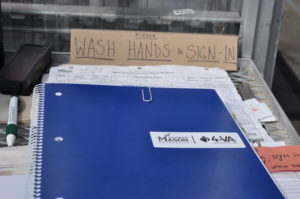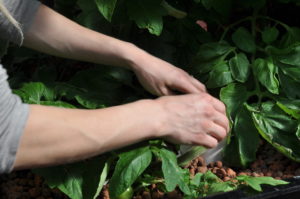 Accessing locally-sourced sustainably-produced fresh food is both a movement and a hot topic nationwide and throughout Virginia – stretching from Shenandoah Valley farms to trendy Alexandria restaurants. However, thanks to a 4-VA grant, the concept has moved beyond just a conversation to a course of study, led by the Director of Environmental and Sustainability Studies at George Mason University, Andrew Wingfield.
Accessing locally-sourced sustainably-produced fresh food is both a movement and a hot topic nationwide and throughout Virginia – stretching from Shenandoah Valley farms to trendy Alexandria restaurants. However, thanks to a 4-VA grant, the concept has moved beyond just a conversation to a course of study, led by the Director of Environmental and Sustainability Studies at George Mason University, Andrew Wingfield.
The Virginia Food System Leadership Institute (VFSLI) was first discussed in 2015 at a 4VA-funded symposium that brought together interested faculty — representing Virginia Tech, University of Virginia, James Madison University and George Mason University — to the Smithsonian-Mason School of Conservation in Front Royal, Va. Also attending the symposium were campus dining services personnel and sustainability managers.
Once there, teams interacted to learn more about associated activities on each campus. Wingfield explains, “There was a lot of energy in the room as we began to understand that we had a shared purpose and potential for many different collaborative opportunities.”
Symposium participants formed the Virginia Sustainable Food Coalition (VSFC). Their mission is to harness the intellectual, human and economic capital of colleges and universities to foster the emerging local food economy in Virginia.
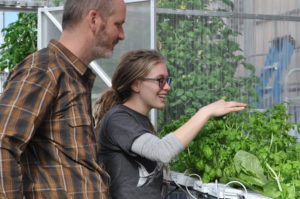 “Schools are spending millions of dollars on food, and we saw the chance to offer campus food providers an option to source fresh, sustainable local fare which would generate both environmental and economic benefits,” says Wingfield. “What’s more, we also recognized the need to support small-to medium-sized growers by helping them access institutional markets — a real boost for Virginia’s rural economy.”
“Schools are spending millions of dollars on food, and we saw the chance to offer campus food providers an option to source fresh, sustainable local fare which would generate both environmental and economic benefits,” says Wingfield. “What’s more, we also recognized the need to support small-to medium-sized growers by helping them access institutional markets — a real boost for Virginia’s rural economy.”
In April of 2016, a second VSFC symposium convened more than 40 Virginia food system stakeholders including farmers and processors; distributors and Aramark and Sodexo representatives; and faculty from the four schools. Their focus was to increase University sourcing of Virginia-grown food.
From Soup to Nuts – A Full Plate of Food Systems Studies
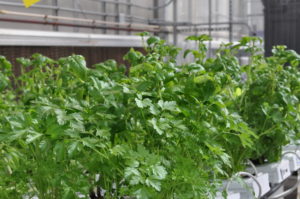 Last year, Wingfield and his colleagues launched the development of the Virginia Food Systems Leadership Institute (VFSLI), a course curriculum to serve both undergraduate and graduate students encompassing a wide range of interdisciplinary studies in food system settings. “We have the unique opportunity to give our students real world job training on a variety of levels and encourage networking opportunities in food systems. VFSLI students will be well positioned to secure employment within the emerging local food economy that they are helping to create,” Wingfield notes.
Last year, Wingfield and his colleagues launched the development of the Virginia Food Systems Leadership Institute (VFSLI), a course curriculum to serve both undergraduate and graduate students encompassing a wide range of interdisciplinary studies in food system settings. “We have the unique opportunity to give our students real world job training on a variety of levels and encourage networking opportunities in food systems. VFSLI students will be well positioned to secure employment within the emerging local food economy that they are helping to create,” Wingfield notes.
The culmination of this effort came to fruition this summer in a three-part intensive experience beginning with two weeks of learning in residence at the Smithsonian-Mason School of Conservation. There, students combine study of sustainable food systems with leadership development work. Food systems experts served on panels that addressed local food sourcing, shared processing infrastructure, labor issues, and strategies for increasing demand for locally-sourced food on campuses. Attendees visited farms, kitchens, and food hubs to learn how food moves around the state. The course then continued with collaborative research projects and concluded with team presentations. The focus of the projects identified opportunities to increase Virginia University sourcing of local and sustainably-produced foods.
A Statewide Collaborative Effort
“We’ve assembled a really dynamic team to teach this course. Along with faculty from the four Virginia Universities, we are working with the Smithsonian Institution and bringing together farmers, processors, distributors, dining providers and representatives from the Virginia Cooperative Extension Service,” says Wingfield.
Wingfield is coordinating VFSLI along with Catherine Christen of the Smithsonian’s Conservation Commons. Participating university faculty include Michael Broderick, Assistant Professor, Communications Studies and Wayne Teel, Professor, Integrated Science & Technology, both from James Madison University; Tanya Denckla Cobb, Director, Institute for Environmental Negotiation, University of Virginia; Mike Ellerbrock, Professor, Agricultural and Applied Economics, Virginia Tech; and Kerri LaCharite, Assistant Professor, Nutrition and Food Studies, George Mason University.
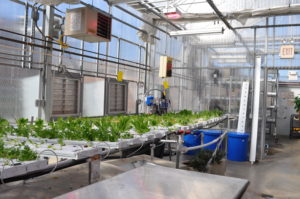 Wingfield credits the 4-VA program that brought this project together. The multifaceted results will include bringing locally-sourced fresh food to college campuses, providing smaller farms access to institutional markets, helping preserve Virginia farmland, and offering job training and networking opportunities for Virginia students interested in food systems professions.
Wingfield credits the 4-VA program that brought this project together. The multifaceted results will include bringing locally-sourced fresh food to college campuses, providing smaller farms access to institutional markets, helping preserve Virginia farmland, and offering job training and networking opportunities for Virginia students interested in food systems professions.
“The 4-VA funding allowed those of us passionate about solving food sourcing and sustainability challenges to join together and create positive change, all while helping our students with a variety of career opportunities,” concludes Wingfield. “This is an exciting and dynamic time to be in the food systems business. Thanks to 4-VA our Virginia students will be at the forefront.”
